Top 5 Affiliate Marketing Tools to Drive Traffic and Conversions
Kirsty Sharman
Est. Reading Time: 12 Mins
Few things are more frustrating than having a powerful force that lifts your business to the Olympus of success, yet not knowing who deserves credit for the journey. If you have a bunch of content creators, bloggers, or influencers bringing you new leads and sales, not having the right affiliate marketing tools in place is a mistake you don’t need.
Here are a few stats to keep in mind:
- Big brands get 5% to 25% of their overall online sales from affiliate marketing.
- Affiliate marketing accounts for 16% of all online orders in the U.S.
- 81% of brands utilize affiliate programs to enhance brand awareness and increase sales.
Impressive, isn’t it? The numbers don’t lie: one of the best ways to boost your sales metrics is to run an affiliate marketing campaign with the help of easy-to-use affiliate marketing tools (aka referral program software). But, how do you choose the perfect affiliate marketing tool for your business? Keep reading to learn everything you need to know!
Table of Contents
Top 5 Affiliate Marketing Tools of 2025
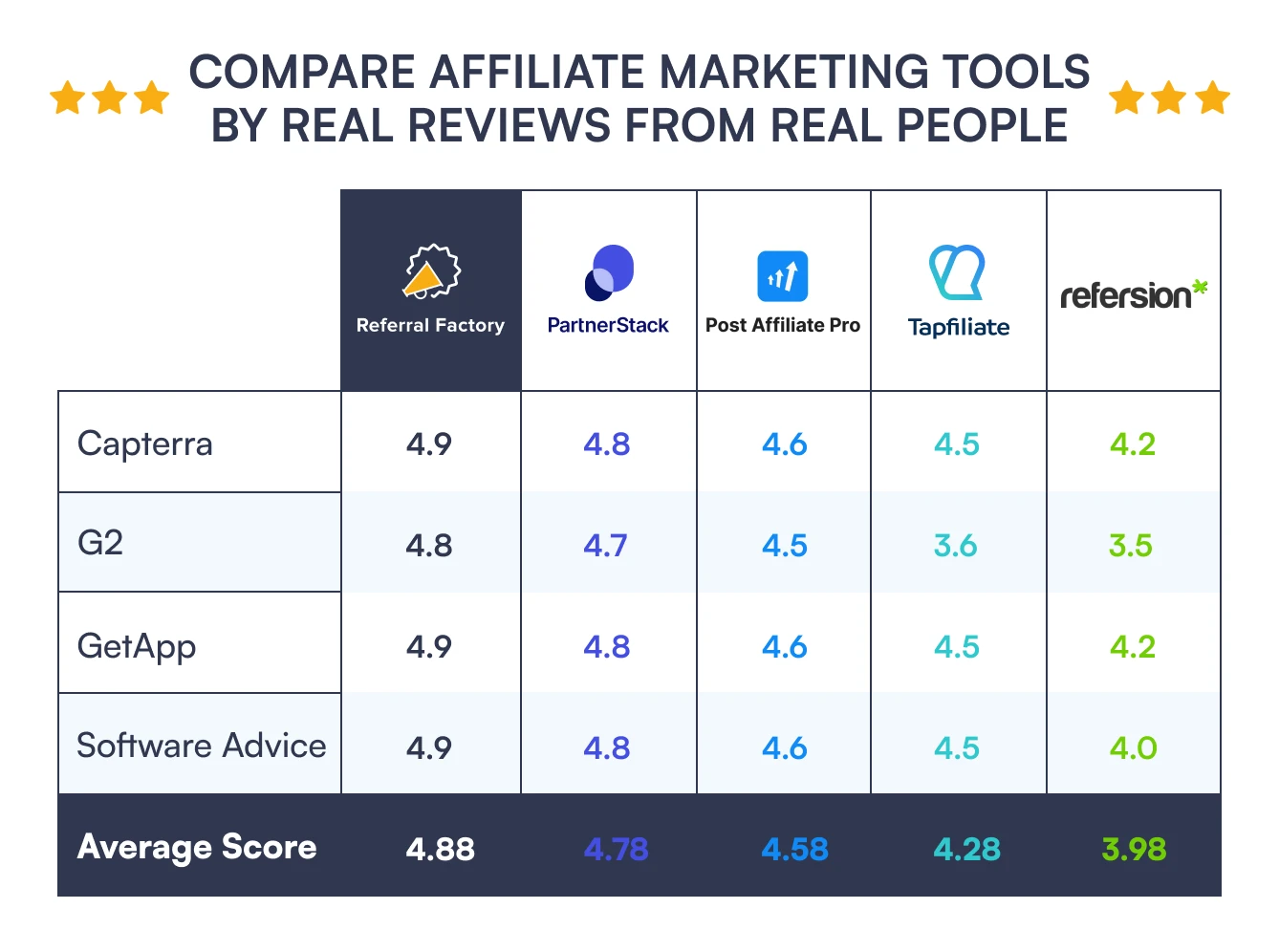
If you think about it, affiliate marketing is a great way to turn your existing customers into your brand marketers. No kidding! By incentivizing your loyal customers and partners to promote your products or services, you can tap into their networks and extend your reach in a highly cost-effective manner.
No matter who your affiliate marketers are, to make an affiliate strategy really work, you need a reliable, feature-rich, and simply tried-and-true tool. Choosing the right affiliate marketing tools is crucial for the success of your program.
Yet, affiliate and referral software varies widely in terms of features, pricing, and user reviews. To help you navigate this landscape, we’ve compiled a list of the top 5 affiliate marketing tools. Read on to learn about your best options!
Free Affiliate Link Generator
Simply enter your website and we'll use AI to auto generate the perfect affiliate program for your brand. It’s free to try.
Try Now1. Referral Factory
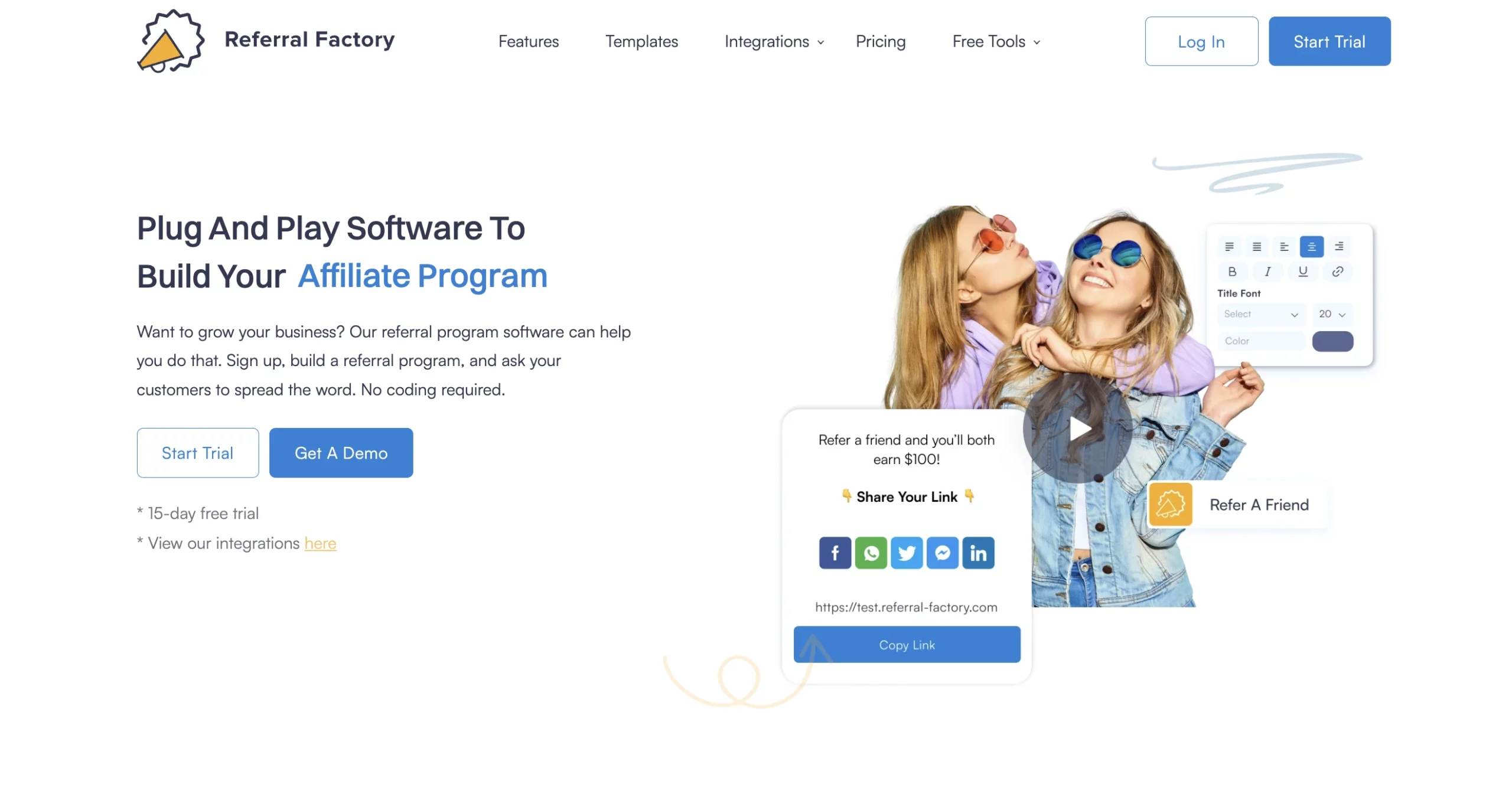
Average review score: 4.88
- Capterra Rating: 4.9
- G2 Rating: 4.8
- GetApp Rating: 4.9
- Software Advice Rating: 4.9
- TrustRadius Rating: 9.3 out of 10
Price range
- Free trial without demo for 15 days
- Starter : $95 / month
- Basic : $200 / month
- Pro : $400 / month
- Enterprise : custom pricing
Description
Referral Factory is one of the most versatile, up-to-date, and easy-to-use affiliate management software programs. All the plans offer a wide range of features, including CRM integrations, thousands of templates, 200+ reward options, customizable affiliate dashboards, powerful tracking and analytics, etc. Referral Factory is known for it’s flexibility and suits businesses of all industries and sizes.
You don’t need any technical knowledge to run an affiliate program with Referral Factory: it’s plug-and-play software built by marketers for marketers. There is no need for you to hire a developer or have any previous affiliate marketing experience to build successful affiliate marketing campaigns. Still, if you feel you need someone to walk you through this affiliate marketing platform, you can book a call with the support team.
The best thing about Referral Factory is that it’s versatile enough to use for affiliate programs as well as customer refer-a-friend programs and influencer programs! From the Basic plan and higher, you can run and track unlimited campaigns. Referral Factory is your one-stop-shop for everything related to tracking referrals.
Most popular features
- A variety of CRM integrations
- Customizable affiliate dashboards where affiliates can track their performance
- Giant library of templates, which simplifies your content creation
- Clear and comprehensive analytics
- Automated commission-calculation and payouts
- High-level of customization
Limitations
Limited number of participants on each plan.
2. PartnerStack

Average review score: 4.78
- Capterra Rating: 4.8
- G2 Rating: 4.7
- GetApp Rating: 4.8
- Software Advice Rating: 4.8
Price range
Custom pricing
Description
PartnerStack is a versatile affiliate tracking tool tailored for mid-level B2B SaaS companies. It provides essential features like automated partner onboarding, real-time analytics, and integrations with popular CRM and marketing tools. The intuitive dashboard allows businesses to manage and incentivize their affiliates efficiently, promoting better performance and growth.
PartnerStack’s ability to support complex partner ecosystems makes it an excellent choice for SaaS businesses aiming to enhance their affiliate marketing efforts and drive revenue through partnerships.
Most popular features
- Automated partner onboarding
- Real-time analytics
- Seamless integrations.
Limitations
- Expensive
- Limited payout scheduling options
- No free trial
3. Post Affiliate Pro

Average review score: 4.58
- Capterra Rating: 4.6
- G2 Rating: 4.5
- GetApp Rating: 4.6
- Software Advice Rating: 4.6
- TrustRadius Rating: 6.5 out of 10
Price range
- 14-day free trial without demo
- Pro: $139 / month
- Ultimate: $269 / month
- Network : $649 / month
Description
Those who have worked in the affiliate marketing industry for a long time know well that Post Affiliate Pro has been on the market for a long time. And if you have a vast experience in affiliate marketing, you will be able to enjoy all its key features. However, if you’re just starting out, you might find a steep learning curve and a high level of complexity.
Most popular features
- Robust analytics and reporting
- Affiliate fraud protection
- Good customer support
Limitations
- Takes time to learn the interface
- Complexity issues
4. Tapfiliate

Average review score: 4.28
- Capterra Rating: 4.5
- G2 Rating: 3.6
- Software Advice Rating: 4.5
- GetApp Rating: 4.5
- TrustRadius Rating: 6.6 out of 10
Price range
- 14-day free trial without demo
- Essential: $89 / month
- Pro: $149 / month
- Enterprise: custom ❗️ Watch out for overage fees on out of bundle clicks and conversions
Description
A user-friendly affiliate website and tracking tool with good automation possibilities and extensive customization. Tapfiliate offers detailed analytics and multiple commission models for a variety of businesses.
Many affiliate marketers say it is an excellent option if you already have your affiliate networks. On the other hand, if you are looking for seamless integrations, many users claim that they face some issues with this. So, make sure you double-check how it works for your business workflows.
Most popular features
- Flexible commissions
- Real-time reporting
- In-platform communication
Limitations
- Limited dashboard functions
- Troubles with streamlining affiliate management
- Integration issues.
5. Refersion

Average review score: 3.98
- Capterra Rating: 4.2
- G2 Rating: 3.5
- Software Advice Rating: 4
- GetApp Rating: 4.2
- TrustRadius Rating: 8.4 out of 10
Price range
- 14-day free trial without demo
- Professional: $119 / month
- Business: $299 / month
- Enterprise: custom pricing
Description
Unlike other affiliate marketing tools that work across niches, Refersion is focused on eCommerce businesses. They offer pre-built apps that seamlessly integrate with multiple platforms like Shopify, BigCommerce, WooCommerce, Magento, Stripe, and Chargebee.
If you aren’t an eCommerce company, this option might not be for you, since it isn’t their specialization. However, if you are an online store owner, it might be a good fit for you. Read a more detailed comparison and find out why businesses choose Referral Factory over Refersion.
Most popular features
- eCommerce platform integrations
- Variety of performance reports
- Many ways to structure commissions.
Limitations
- Limited to eCommerce alone
- Some users report too many notifications
- Customer support takes time to answer
Feature Comparison of the Best Affiliate Marketing Tools
How do you choose the best affiliate marketing tool for your business’ needs? A good start is to create an affiliate marketing strategy and find the best fit for the key objectives and processes you identify. Then, you can look at which features will be most important for you.
For some businesses, the lack of particular features can be devastating. Luckily, you don’t need to research all that by yourself to find which software is the most feature-rich. We did it for you:
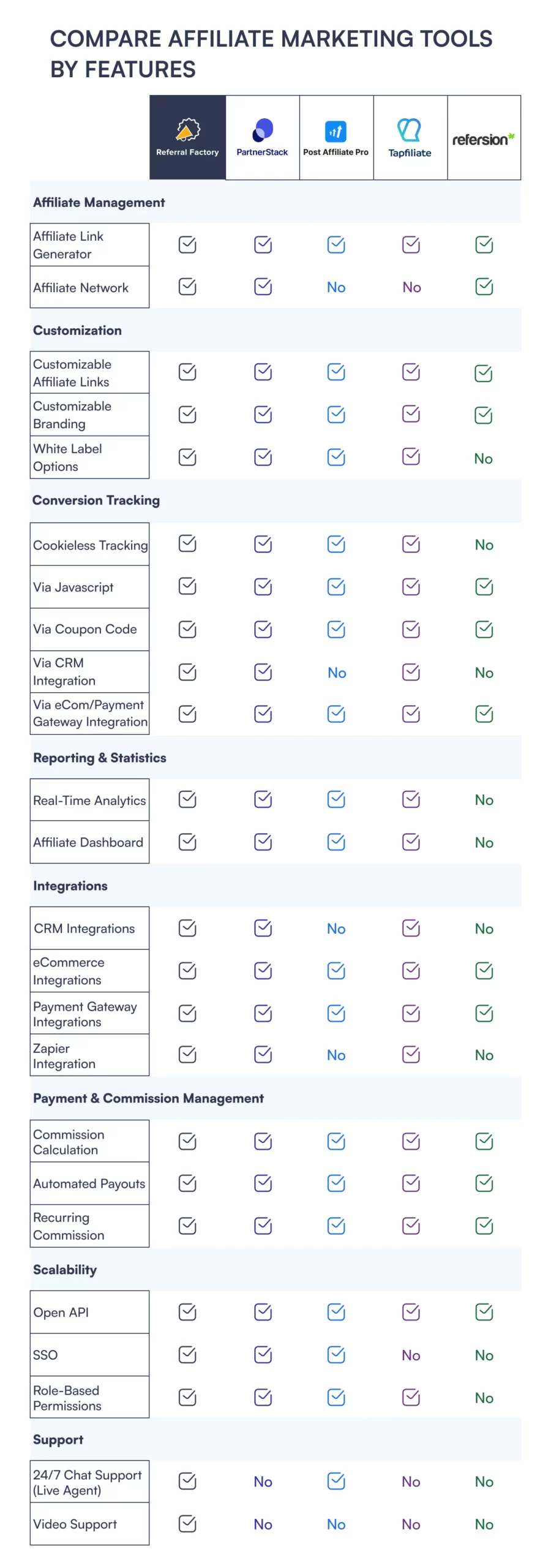
How to Choose the Right Affiliate Marketing Tools for Your Business
Now you know who’s the best of the best. If you’re still wondering which tool to choose, let’s take a closer look at what you should pay attention to.
Step 1: Identify Your Current Business Needs
We’ve covered the types of businesses that can really benefit from an affiliate strategy and the tools to make it happen. If your business sounds like one of them, don’t hesitate to dive into one of the tools we’ve already listed. They might just be the game-changer you need! However, if you are still unsure whether software is right for your case, it is time to identify your current business needs.
First things first – what exactly do you need? Are you looking to track affiliate performance, manage payouts, or perhaps both? Would your business benefit from a specialized affiliate program or should you start by targeting customer referrals? Understanding your specific requirements will save time and help you avoid unnecessary confusion when picking the right option.
Step 2: Evaluate User-Friendly Interfaces
Nobody likes clunky software. Choose tools that have intuitive, user-friendly interfaces. If it feels like you need a Ph.D. to navigate the dashboard, it’s probably not worth your time. Look for tools that make your life easier, not harder. For example, with Referral Factory, both your business and your affiliates can easily track their progress with little effort. This is what you call an intuitive interface.
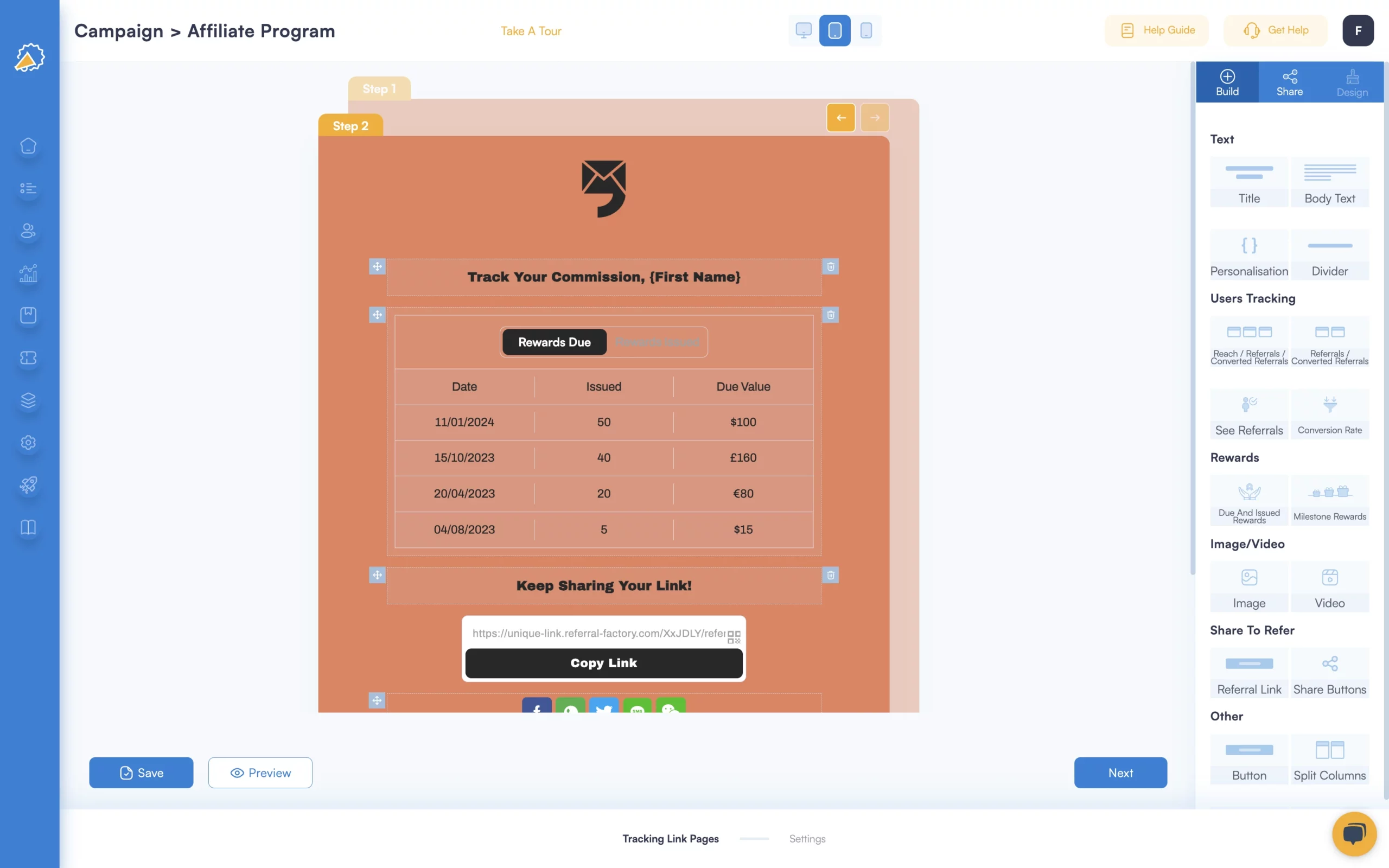
Step 3: Check Integration Capabilities
A lack of integrations can add hours of unnecessary work, even when performing simple actions to manage your affiliate sales. Your affiliate tool should play well with others. So, ensure they integrate seamlessly with your existing e-commerce platform, payment gateway, or CRM systems.
Integrations with affiliate marketing tools are particularly important when it comes to two key functions: managing conversion tracking and capturing leads. With effective conversion tracking, you can precisely measure the success of your marketing strategies, optimizing for higher ROI by understanding which efforts drive the most conversions. Additionally, capturing leads from multiple sources into a single system allows for streamlined communication and nurtures potential customers more efficiently.
Pro tip: If your tool of choice doesn’t integrate directly with your existing tech stack, check if they integrate with middleware like Zapier.
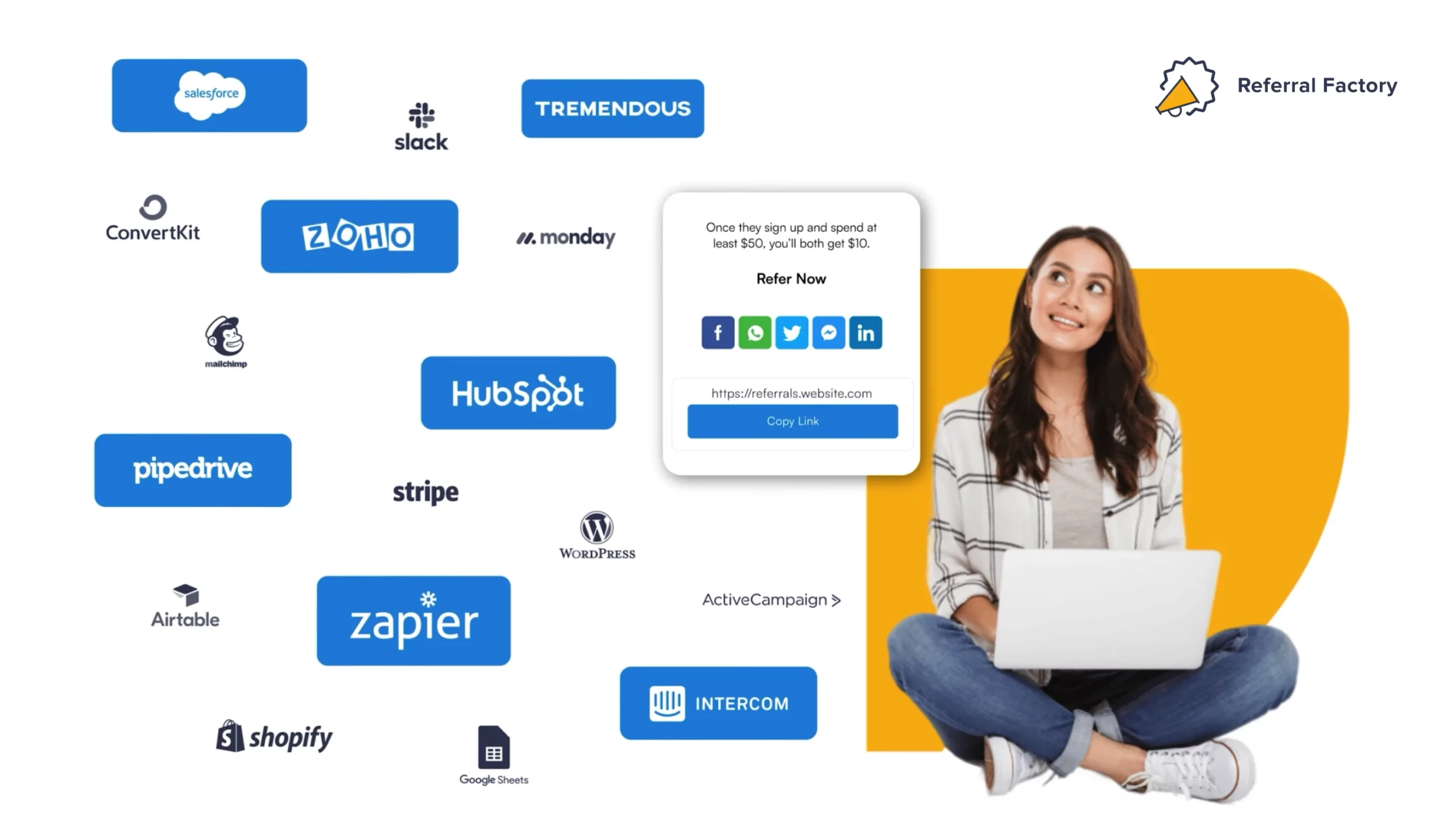
Step 4: Analyze Reporting Features
Data is king. That’s why the right tools should provide comprehensive reporting and analytics features. It is one of the primary reasons you need this affiliate tool in the first place! You want to be able to track clicks and conversions without needing a magnifying glass. Clear, actionable insights are your best friend. No successful business can track affiliate sales well without proper built-in analytics.
However, beware of overly detailed, fluffy analytics that don’t translate into your bottom line. The most important metrics you need are clicks, leads and conversions.
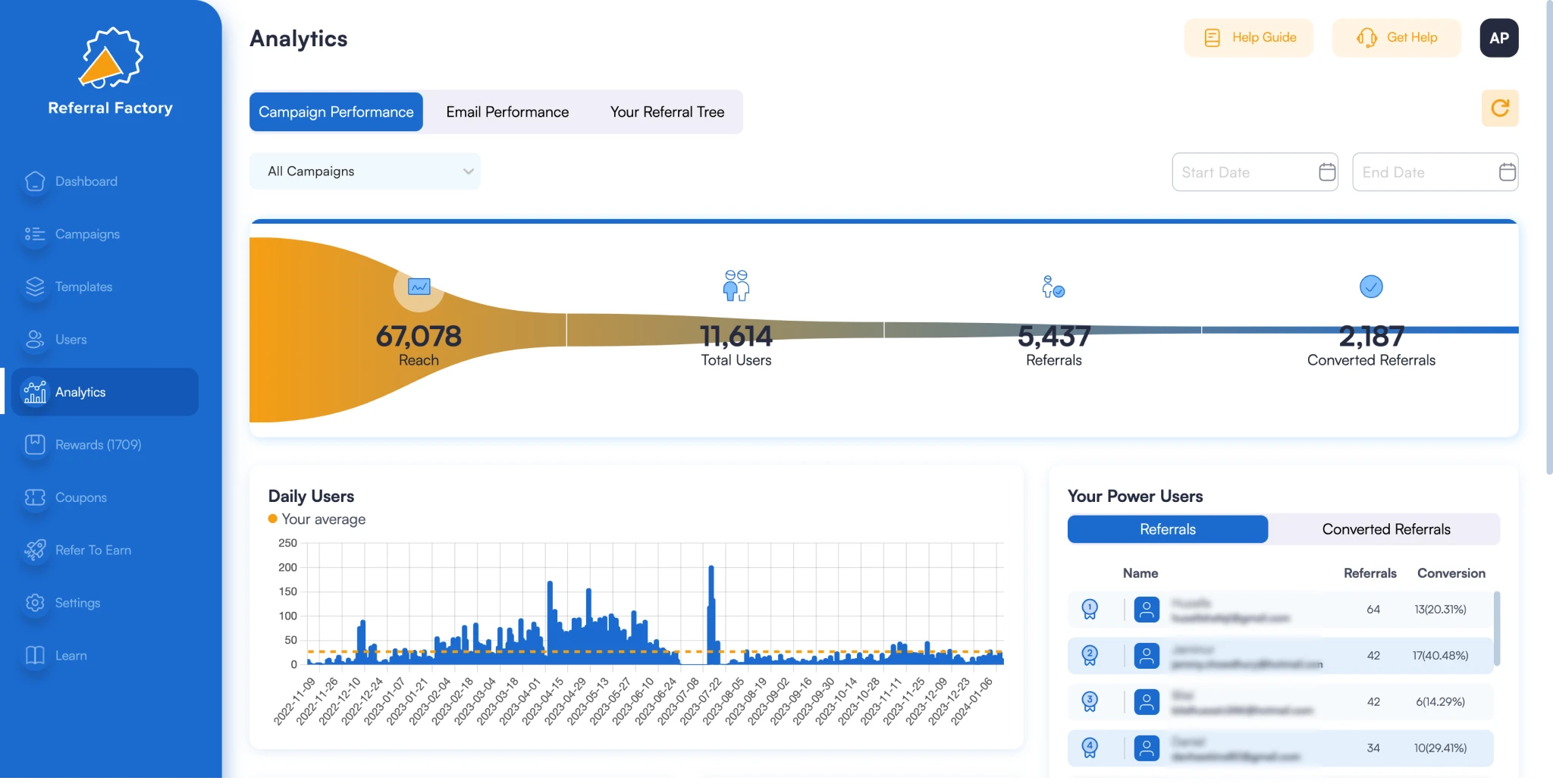
Step 5: Review Pricing Plans
A lot of what is possible depends on your budget. If you’re ready to pay more, don’t rush. Some top affiliate marketing tools might offer free trials or tiered pricing, which can be a great way to test the waters without diving into a commitment. Be sure to check out scalability options as moving software at a later stage can be a tracking nightmare.
Also, watch out for out-of-bundle overage charges. These can quickly add up and blow your budget if your campaigns perform better than expected. Understanding the full cost structure, including potential hidden fees, is crucial to avoid unpleasant surprises. Look for tools that offer transparent pricing and consider how costs might evolve as your affiliate program grows.
Step 6: Test Drive Before You Buy
Whenever possible, take advantage of free trials or demo versions of the software. This hands-on experience can give you a real sense of whether the tool fits your workflow and the needs of your own campaigns. Don’t just rely on reviews and recommendations. Experiencing the tool firsthand can reveal strengths and weaknesses you might not have anticipated.
When Should You Start Using Tracking Software for Your Affiliate Program?
It may be unclear when exactly you should start the actual tracking. Well, if you ask most affiliate marketers, they would probably say something like “from your very first affiliate campaign.”
Sure, that is the right answer, but it isn’t quite complete when it comes to real-life business processes. Let’s go over what else you should know:
1. At the Beginning of Your Affiliate Program
Yes, starting to track your affiliate programs from day one is a strategic move. It allows you to establish a solid foundation for your program. You can make sure that you have all the necessary data to make informed decisions right from the start. With tracking software, you can monitor which affiliates are driving the organic traffic, which products are performing best, and what improvements you need.
2. If You Have More Than One Affiliate
If you decide to leverage multiple affiliate networks (which is completely normal for the affiliate marketing industry), then you need a proper affiliate tool to avoid chaos. It is actually simple: if your affiliate marketing program involves different affiliate networks, manual tracking becomes impractical and prone to errors.
As your program scales, the complexity of managing and tracking each affiliate’s performance increases exponentially. Implementing tracking software helps you keep everything organized, automates the tracking process, and ensures accuracy in reporting.
3. When You Need Detailed Insights
When you reach the point where you need more than basic metrics, such as clicks and sales, it’s time to invest in tracking software. If your affiliate revenue is growing and you have successful affiliate sites, you definitely need detailed insights.
Advanced tracking tools provide in-depth data about customer behavior, conversion rates, and the overall effectiveness of your affiliate marketing campaigns. This granular data is essential for optimizing your strategy and making data-driven decisions.
4. When You Integrate Multiple Marketing Channels
If your affiliate program is part of a broader marketing strategy that includes multiple channels, tracking software is indispensable. This is a clear sign you need to use an affiliate marketing platform, and it should be a good one.
A good affiliate marketing tool will help you attribute conversions accurately and ultimately understand which channels and affiliates are contributing the most to your sales. This holistic view enables you to allocate your marketing budget more effectively and fine-tune your campaigns for better results.
6. When You Want to Improve Transparency and Trust
Trust is crucial in affiliate marketing. Affiliates need to trust that they are being credited for the traffic and sales they generate. By using tracking software, you provide a transparent and reliable system that affiliates can count on.

This transparency can help attract and retain high-quality affiliate marketers who are confident in the accuracy of your tracking and reporting. Besides, if you show that you work with the best affiliate marketing tools, your affiliate network will grow naturally.
For example, in Referral Factory, every affiliate can check their results by simply clicking on their unique link. When they see their progress and reward, they become more interested in getting even more sales for your business.
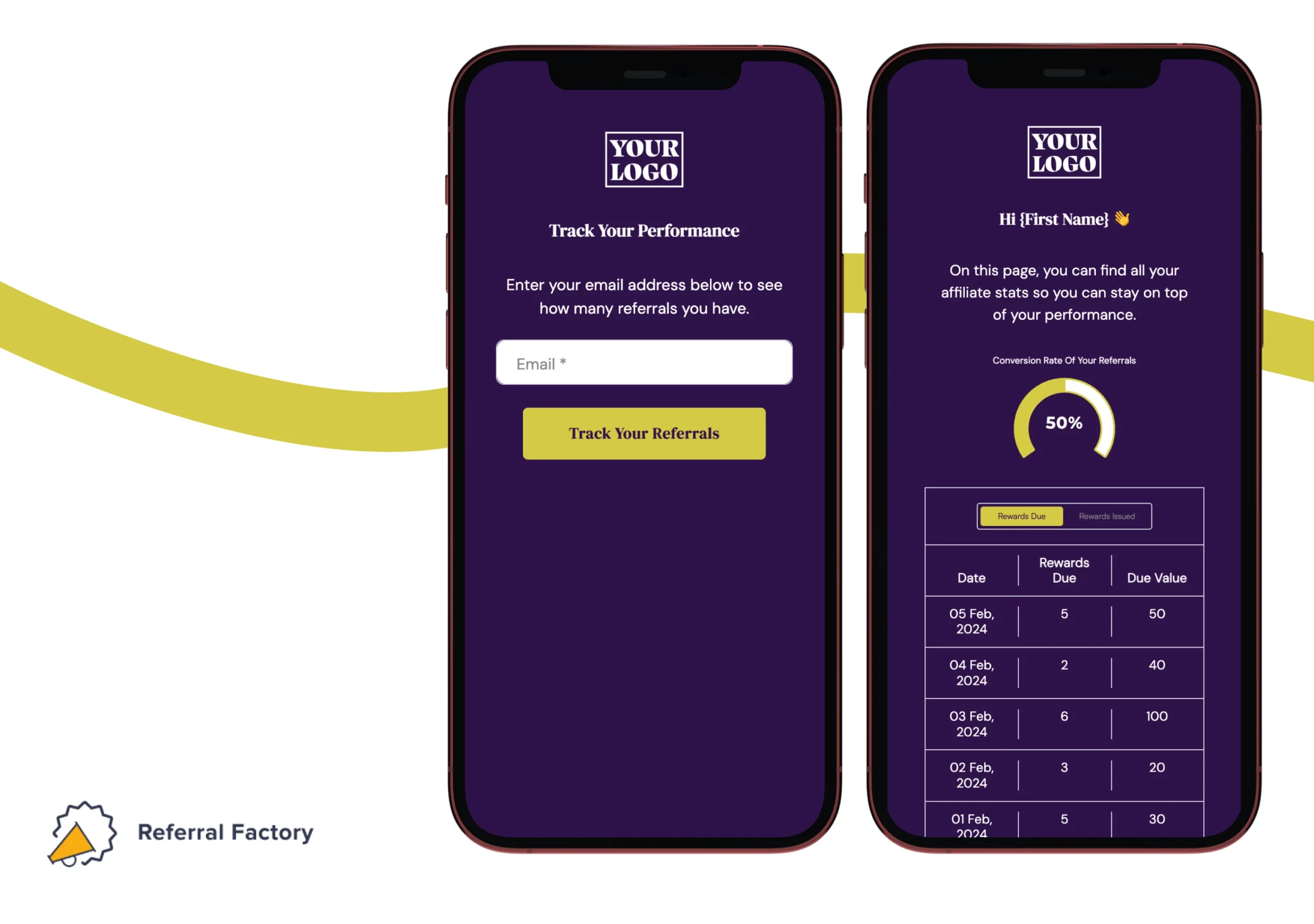
Can You Use Affiliate Marketing Tools to Run Referral & Partner Programs?
The short answer is “yes”. But if you are looking for a more detailed one, here goes: affiliate marketing, referral programs, and partner programs all share a common goal – to drive sales and grow your business through third-party promotions.
While the mechanisms might differ slightly (e.g., affiliates typically receive a commission for sales, while referral programs might offer discounts or rewards for recommendations), the underlying principles are similar.
Because of these similarities, the best affiliate marketing tools often come with features that can be easily adapted for managing referral and partner programs. Comprehensive affiliate software usually offers a complete experience for businesses, helping to manage affiliate, referral, and partner programs from a single platform.
Using affiliate marketing tools for referral and partner programs brings several key benefits to your business:
- Efficiency: Manage all your programs from one platform, which reduces complexity and saves time.
- Scalability: As your business grows, these tools can scale with you, managing more affiliates, referrers, and partners seamlessly.
- Data-Driven Decisions: Access analytics to optimize your strategies, make informed decisions, and improve ROI.
- Stronger Collaborations: Automating payouts and communication channels helps foster trust and long-term relationships with affiliates, referrers, and partners.
Wrapping It Up
Affiliate marketing tools are a huge asset for businesses aiming to grow through third-party promotions. These tools simplify the management of affiliate, referral, and partner programs, while providing the insights needed to optimize your strategies. By selecting the right tool, you can enhance efficiency, scalability, and data-driven decision-making, ensuring long-term success in affiliate marketing.
FAQ
What tools are needed for affiliate marketing?
To succeed in affiliate marketing, businesses need comprehensive software to manage and track their affiliate relationships, monitor performance, and handle payouts. Analytics tools are essential to understand what’s working, while email platforms help nurture affiliate relationships. Additionally, having a robust link tracking system is key to measuring the success of affiliate campaigns.
What are the top AI tools for affiliate marketing?
AI tools for affiliate marketing enhance efficiency by automating tasks such as tracking affiliate performance, optimizing campaigns, and predicting trends. These tools help identify high-performing affiliates, provide insights on customer behavior, and improve overall campaign effectiveness through data-driven recommendations.




